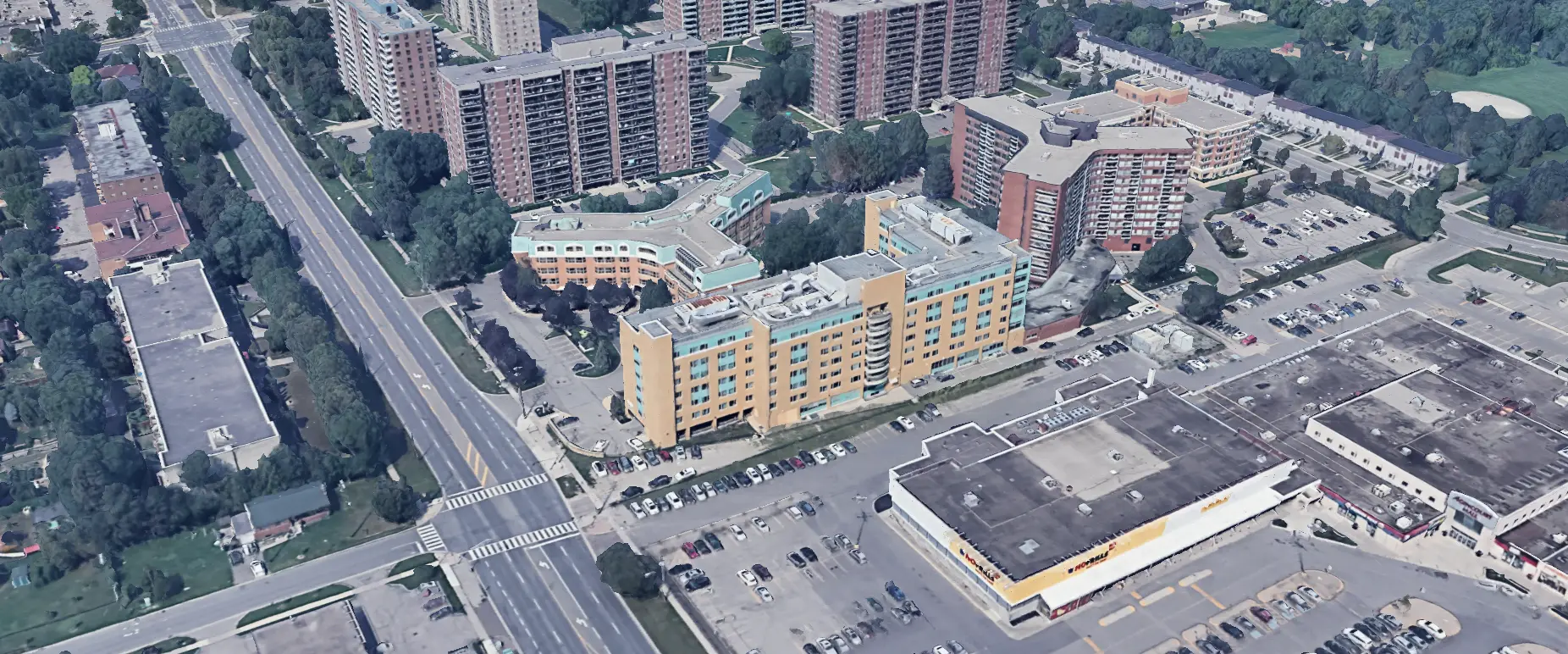Shepherd Lodge (3760 Sheppard Avenue East, Toronto) is operated by Shepherd Village Inc. The facility has a capacity of approximately 252 beds.
In this article, our Good Caring Canada team has reviewed Shepherd Lodge from three essential angles: inspection reports, performance indicators, and resident profiles. You are encouraged to thoroughly review all three angles so you can be more informed about the quality and safety of Shepherd Lodge.
Table of Contents:
- Inspection Reports for Shepherd Lodge
- Performance Indicators for Shepherd Lodge
- Resident Profile of Shepherd Lodge
Inspection Reports for Shepherd Lodge
Shepherd Lodge is regulated by the Ontario Ministry of Health and Long-Term Care. The Ministry conducts inspections of all long-term care facilities to ensure that operations are in compliance with provincial regulations, and that residents receive proper care.
Our Good Caring Canada team has summarized inspection reports for Shepherd Lodge. Original copies of the inspection reports can be read in the Government of Ontario website.
🔍 June 2023: Inspection
The inspection for Shepherd Lodge, addressed two main intakes. The intakes involved complaints related to reporting certain matters to director, and skin and wound care.
- Reporting Certain Matters to Director: The licensee failed to ensure that alleged resident-to-resident abuse was reported immediately to the Director. A Critical Incident Report (CIR) was submitted regarding the abuse but was not reported immediately to the Director. RPN #103 informed the nurse manager of the incident on the day it occurred, but the Assistant Director of Care (ADOC) #112 and Director of Care (DOC) confirmed the nurse manager did not report the incident to the Ministry of Long-Term Care (MLTC) as required.
- Skin and Wound Care: The licensee did not ensure a resident’s altered skin integrity was reassessed at least weekly by registered nursing staff. The resident’s clinical records showed that weekly assessments were not completed for six weeks between April and June 2022. RPN #120 and ADOC #112 acknowledged the failure to complete the required weekly reassessments, which posed a risk of delayed treatment and wound healing
🔍 December 2022: Inspection
The inspection for Shepherd Lodge, addressed two main areas of non-compliance. The intakes involved failures in infection prevention and control.
- Personal Protective Equipment (PPE) Compliance: The licensee did not ensure that staff followed the Infection Prevention and Control (IPAC) standards for the proper use of Personal Protective Equipment (PPE). During the inspection, it was observed that a Personal Support Worker (PSW) exited a resident’s isolation room without removing their soiled PPE and walked down the hall wearing it. Another PSW improperly wore two masks simultaneously. Multiple staff members were also seen wearing masks below their nose or chin. These lapses could have led to further transmission of infections, including COVID-19.
- Hand Hygiene Compliance: The licensee failed to ensure the availability and use of effective hand hygiene agents. During the inspection, multiple bottles of hand sanitizer with expired dates were found throughout the home. The use of expired hand sanitizers poses a risk of ineffective hand hygiene, increasing the potential for spreading infectious agents, including COVID-19.
🔍 July 2022: Inspection
There were no findings of non-compliance.
🔍 June 2022: Complaints Inspection with Order(s) of the Inspector
The inspection for Shepherd Lodge addressed complaints related to non-compliance of food and care.
- Menu Planning: The licensee did not ensure that the menu cycle included menus for regular, therapeutic, and texture-modified diets for both meals and snacks. Observations identified outdated information sheets for restricted potassium and lactose diets, which placed the responsibility on frontline staff to make appropriate substitutions. A random audit revealed that 12 residents with therapeutic diet orders lacked corresponding menu cycles. This non-compliance posed a risk to residents’ health and well-being.
- Individualized Menus: The licensee failed to develop individualized menus for residents whose needs could not be met through the home’s standard menu cycle. One resident expressed a strong dislike for the home’s food and reported often being hungry. Despite documented dietary preferences, no individualized menu was in place. Interviews confirmed that attempts to provide preferred foods were made but not formalized into a specific menu plan. A compliance order was issued, requiring the licensee to ensure all residents requiring therapeutic diets have appropriate menus in place for both meals and snacks as well as residents to be provided with a variety of options that meet nutrition requirements, social needs, and individual cultural and religious preferences. The order also highlighted the severity and scope of the non-compliance and the potential risk to residents’ health.
- Bathing: The licensee did not ensure that residents were bathed at least twice a week by their preferred method. A complaint revealed that an identified resident had not been showered in several days. Interviews confirmed the resident was given bed baths instead of their preferred showers, contrary to their care plan. Documentation failed to include these deviations, and staff were aware of the unresolved issue.
🔍 November 2021: Complaints Inspection with Order(s) of the Inspector
The inspection of Shepherd Lodge, addressed multiple intakes involving a plan of care, infection prevention and control, forwarding complaints, and reporting to the director.
- Plan of Care: The licensee failed to ensure the care specified in residents’ plans of care was provided. Despite a compliance order from a previous report, staff continued to be non-compliant, resulting in harm to the resident #009. A video showed staff holding the resident’s arms during care, contrary to the plan of care. This resulted in the resident sustaining an injury. Next, a critical incident report revealed that a PSW did not provide nutritional supplements as required, leading to neglect of the residents #006 and #007 care needs. Finally, resident #003 at risk for falls, did not have a specified intervention in place, as required by their plan of care, increasing the risk of unmet care needs.
- Infection Prevention and Control: The licensee failed to ensure that all staff followed the home’s infection prevention and control practices. A PSW was observed using the same gloves for multiple tasks, increasing the risk of spreading infections.
- Forwarding Complaints: The licensee did not immediately forward a written complaint concerning resident care to the Director, as required by regulations.
- Reporting to the Director: The licensee failed to immediately report alleged improper care and abuse to the Director. Incidents involving residents #009, #006, and #007 were not reported in a timely manner, which could delay necessary corrective actions.
Performance Indicators for Shepherd Lodge
Our research team at Good Caring Canada has compiled data on seven key performance indicators for long-term care facilities in Ontario.
We invite you to review each of the below indicators — to compare Shepherd Lodge with other long-term care facilities in Ontario.
- 💊 Potential misuse of antipsychotics is measured by the percentage of residents taking antipsychotic drugs, without a diagnosis of psychosis
- 🔒 Potential excessive use of physical restraints is measured by the percentage of residents in daily physical restraints
- 🤕 Fall risk is measured by the percentage of residents who fell in the 30 days leading up to the date of their quarterly clinical assessment
- 🦽 Worsened physical functioning is measured by the percentage of residents who worsened or remained dependent in transferring and locomotion (mid-loss ADLs), less residents who improved or remained independent
- 🩹 Worsened pressure ulcers is measured by the percentage of residents whose stage 2 to 4 pressure ulcer worsened since the previous assessment
- 😣 Pain is measured by the percentage of residents who report to have moderate daily pain or horrible/excruciating pain at any frequency
- ☹️ Worsened depressive mood is measured by the percentage of residents whose mood from symptoms of depression worsened
Resident Profile of Shepherd Lodge
Understanding the resident profile of a long-term care facility can help you assess the facility’s appropriateness and compatibility for a patient. Our research team at Good Caring Canada compiled data on three main elements to understand resident profiles. We invite you to review each of the three below elements.
- 👵🏻 Gender profile can be helpful for assessing the gender compatibility of a long-term care facility.
- 👴🏻 Age profile can be helpful for assessing whether a long-term care facility has experience in caring for residents of specific age groups. More residents of advanced age may imply potential challenges to adequate and equitable care for all residents in the facility.
- 💭 The percentage of residents with dementia can be helpful for assessing whether a long-term care facility is aware and ready for dementia care. A higher percentage may imply more relevant care services. A higher percentage may also imply potential challenges to adequate and equitable care for all residents in the facility.

